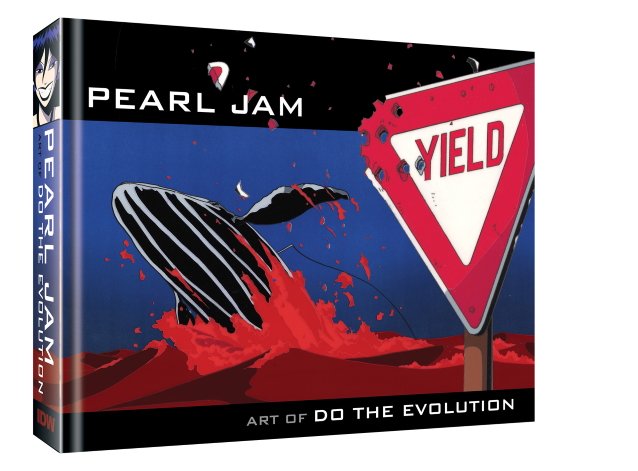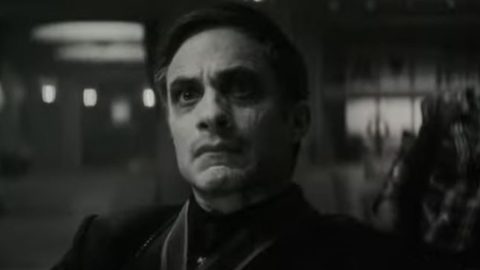
final Vendetta is a reminder that scrolling beat ‘em ups will always have a foot in the 1980s. Not only because that was the genre’s heyday, but because it was tied to the American culture of the era – a time of urban crime epidemics and Reaganite scare stories of a New York or LA teeming with muggers and pimps. Even though Final Vendetta relocates its action to London, then, its heart is still very much in that past, and old-fashioned fantasies of black and white morality. In this world, when low-life thugs kidnap your sister, that’s a perfect excuse to take the law into your own hands, strolling all the way to the big boss’s hideout, cracking skulls en route.
This simple scenario itself is a nod to classics such as Final Fight and Double Dragon, and a sign that Final Vendetta has its head firmly stuck in ’80s arcades. It’s a vibe that endows it with a certain raw purity compared to many made-for-console brawlers, and deep genre knowledge oozes through its design. The other side of that coin, however, is that once it’s placed next to the likes of Streets of Rage 4, it reveals a shortfall of sophistication. In that company, Final Vendetta feels unreconstructed, and less able to straddle past and present with assured poise.
Still, the foundations are solid, with a robust feel from the moment you step out onto Final Vendetta’s mean streets. Here you’ll find chunky pixel art protagonists who reproduce the swagger of their historical brethren, and shop fronts then subway stations then nightclub interiors scattered with seedy details, from alley rats to disco balls. Even the local thugs are as stylish as they are dangerous, taking colourful cues from ’80s punk and hip hop fashions. And speaking of hip hop, the one thing that really sets Final Vendetta off on the right foot and holds it steady is its soundtrack, which gives the anthems of Streets of Rage a run for their money – no mean feat. From the title screen you’re hit by bouncing late 80s style instrumental cuts, provided by old hands Featurecast and Utah Saints, which never fail to hike the game’s intensity.

And once the fighting begins it quickly slips into the rhythm. Beat ‘em up veterans will find themselves in lockstep immediately, rocking punk heads back with combos of jabs crowned by a dismissive scissor kick, grabbing opponents and hurling them into their mates, or double-tap charging across the screen to deliver burly knockdowns. As ever, you’ll need to work on closing gaps, herding enemies to one side, and simply beating them to the punch, since they don’t stand idly by for long.
Your choice from among three playable characters will also affect how you approach the task. Duke is the all-rounder, like a younger Adam from Streets of Rage. Claire (whose sister has been nabbed) is the quick hitter, like, well, Blaze from Streets of Rage, but more sensibly dressed. Miller is the big wrestling lad, a sack of muscles garnished with a mullet. With him you’ll want to focus more on grabs and throws, while the faster protagonists can find more success by carefully lining up and smacking fools.
Whatever your flavour, all three have a decent range of moves, including a few fresh attacks to bolster the usual beat ‘em up routines, although some are more useful than others. One tactically interesting flourish is the introduction of a ground game, where knocking enemies flat on their backs opens an invitation to literally kick them while they’re down, perhaps finishing them off before they cause more trouble. That will leave you vulnerable to other attackers, however, and some types of fallen foe recover with sweeping counters, so you need to bear in mind who you’re shoeing and back off before they rise.

Other moves, especially defensive ones, are a little less worth adding to your repertoire, however. Streets of Rage 3 style vertical dodges are only occasionally handy, for instance, while the addition of a block button seems at odds with a combat rhythm with the onus on clearing threats before they get a chance to act. There’s also a special attack that clears space all around you, but drains health unless you wait for a charging Super bar to fill up first. It’s often invaluable, but compared to Streets of Rage 4’s equivalent, where you lose health but can recoup it with follow-up attacks, it’s far less elegant in its implementation.
Some other bugbears, meanwhile, are hangovers from the sins of past titles. Some enemies still loiter around the wings of the stage, for example, sucker punching you from offscreen if you approach the edge. Plus, many attacks have poorly defined vertical range, enabling bad dudes to hit you from above or below when you don’t expect it. Sure, you get used to it, even learn to exploit it for your own moves, but it remains unintuitive.
Final Vendetta’s larger issue, however, is that it’s too reluctant to let loose with its design. Like a cover band, it knows all the hits and plays them proficiently, but seems wary of injecting too much of its own identity into the set. For all the pixel perfection in those arcade landscapes, the choice of locations never surprises, nor is there much scenery to interact with once you’ve smashed up the bins for food scraps. Weapons feel like an afterthought, appearing infrequently, lacking wallop and conferring no obvious advantage. While the street goons are always the usual suspects – denim punks, stocking-clad whip girls and biker boys – and bosses ultimately prove themselves to be all too basic.

This ascetic mentality creeps into Final Vendetta’s choice of modes and options too. Decide between Easy and Hard (the former gives you a couple more lives and features fewer enemies), select a character, then off you go through its six stages. Run out of lives and, well, that’s it. Time to start again. Without a continue option, this is not a game you can lazily smash through with a partner in two-player mode (even in Easy, there’s a significant learning curve, and it should take several tries to reach the end). And without a level select option, you can’t practice later sections without doing the whole thing again.
Some other alternatives open up once you complete the game, but they aren’t much to write home about either. There’s a Boss Rush mode (which thanks to its short, underwhelming cast may well be the weediest of its kind in history), a Survival mode, an Ultra difficulty setting and a sparse Training mode (why isn’t that available from the start?). Even for a focused, arcade-style experience, by today’s standards it’s something of a sparse offering.
That said, Final Vendetta holds together as a solid core experience, and with rose-tinted specs removed, a more enjoyable one than Final Fight itself these days. But it’s hard not to keep thinking of Streets of Rage 4, which offers much more besides and serves it up with greater finesse. In comparison, Final Vendetta feels like it’s longing for some mythical good old days, refusing to admit that progress has made some things better after all. Like those 80s vigilante power fantasies about cleaning up the streets, it’s staunchly conservative.
Final Vendetta launched today (June 17) for PC, PS4, PS5, Xbox One, Xbox Series X|S and Nintendo Switch. Tested on PC.
The Verdict
Final Vendetta is a scrolling beat ‘em up in the classical mould with some modern sharpness and refinement, and genre devotees will slide comfortably into its challenges and appreciate its boosted retro aesthetic. It does, however, lack complexity compared to reecnt efforts, and fails to push the boat out when it comes to its locations, enemies and bosses. As much as it puts up a decent fight, then, it’s never quite a knockout.
Pros
- A banging soundtrack
- Striking pixel art
- Solid combat foundations
Cons
- Unimaginative enemies and locations
- Narrow selection of options and game modes
- Boss designs are too basic
The post ‘Final Vendetta’ review: A robust brawler short on modern sophistication appeared first on NME.





